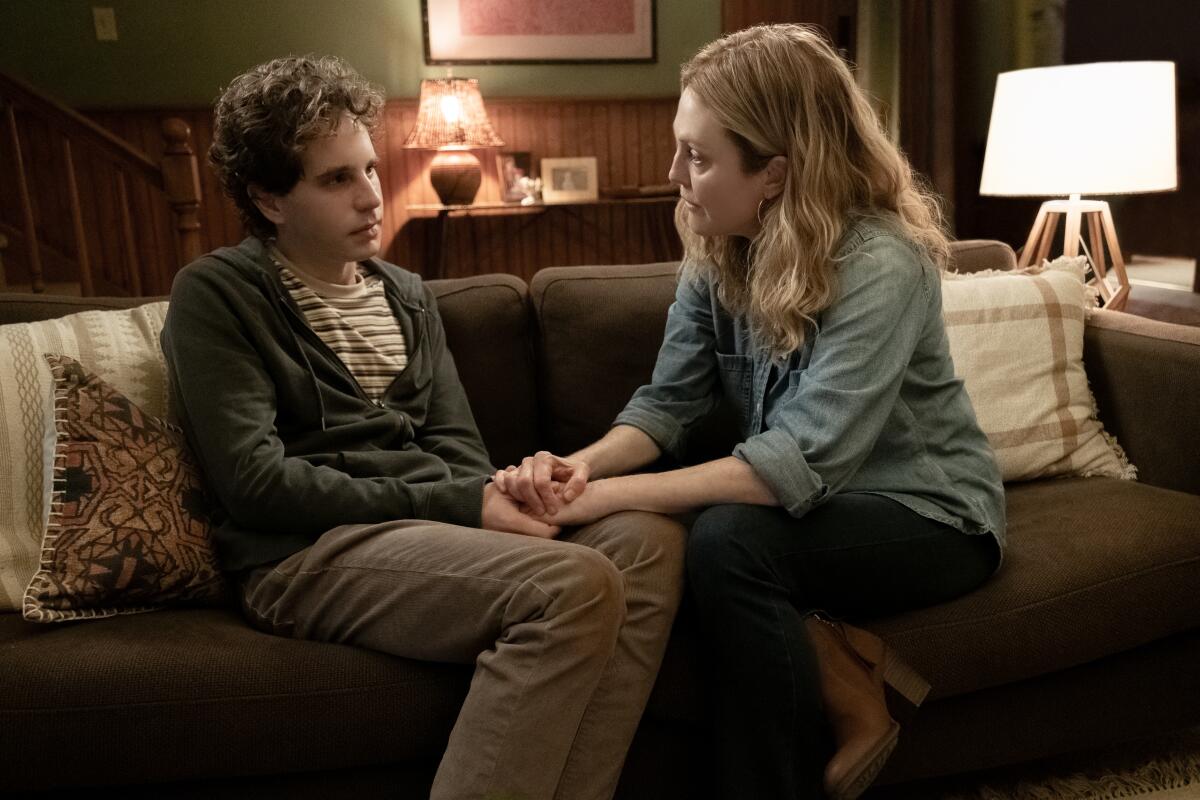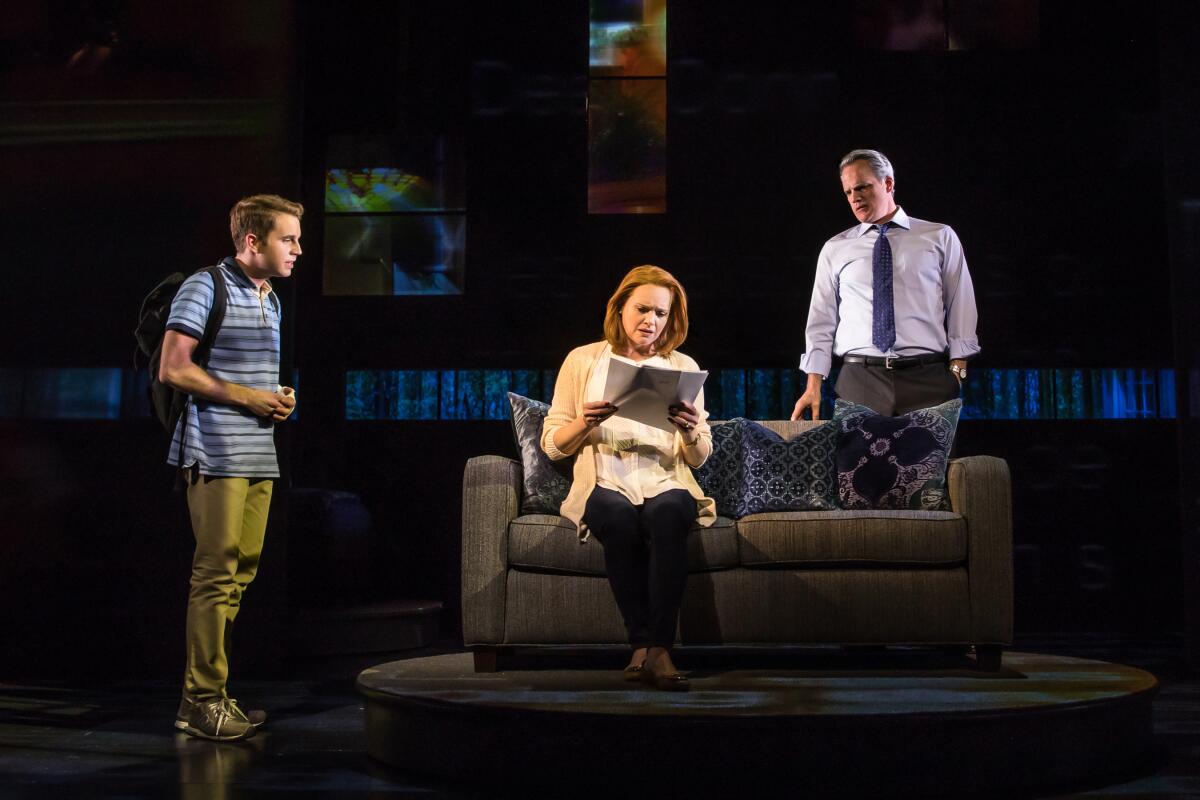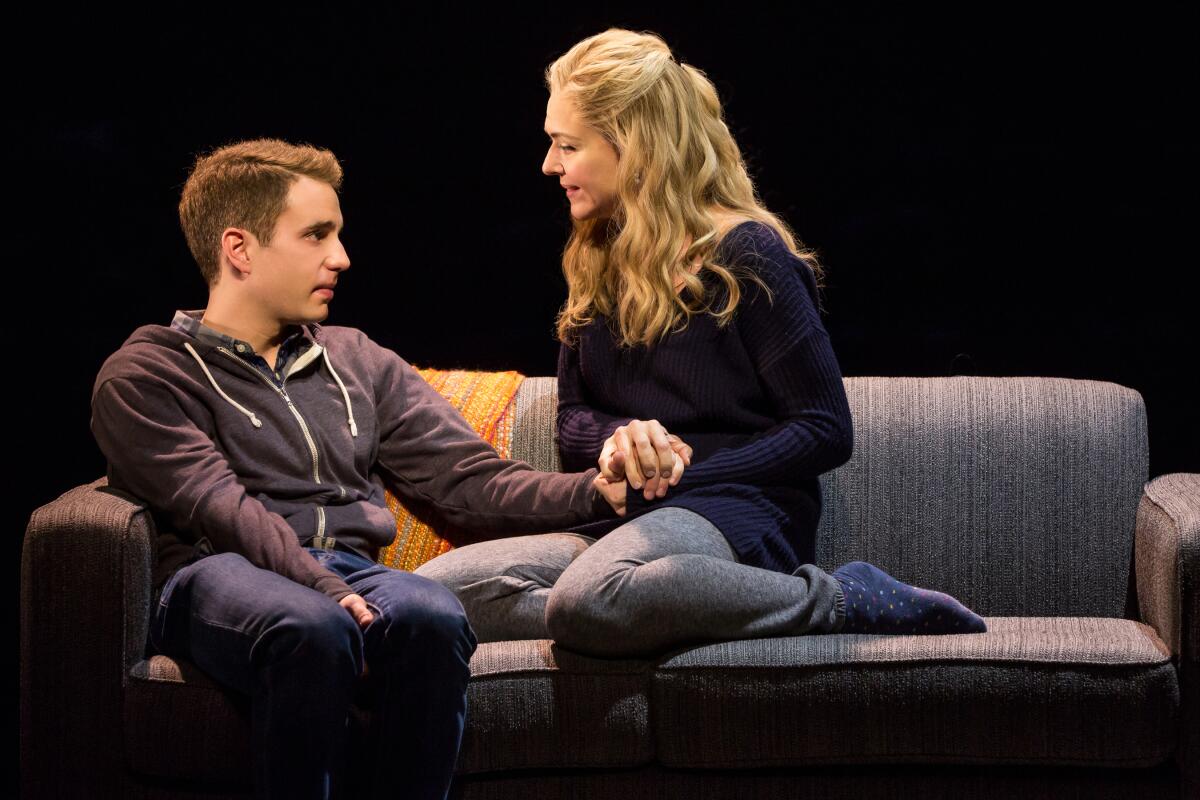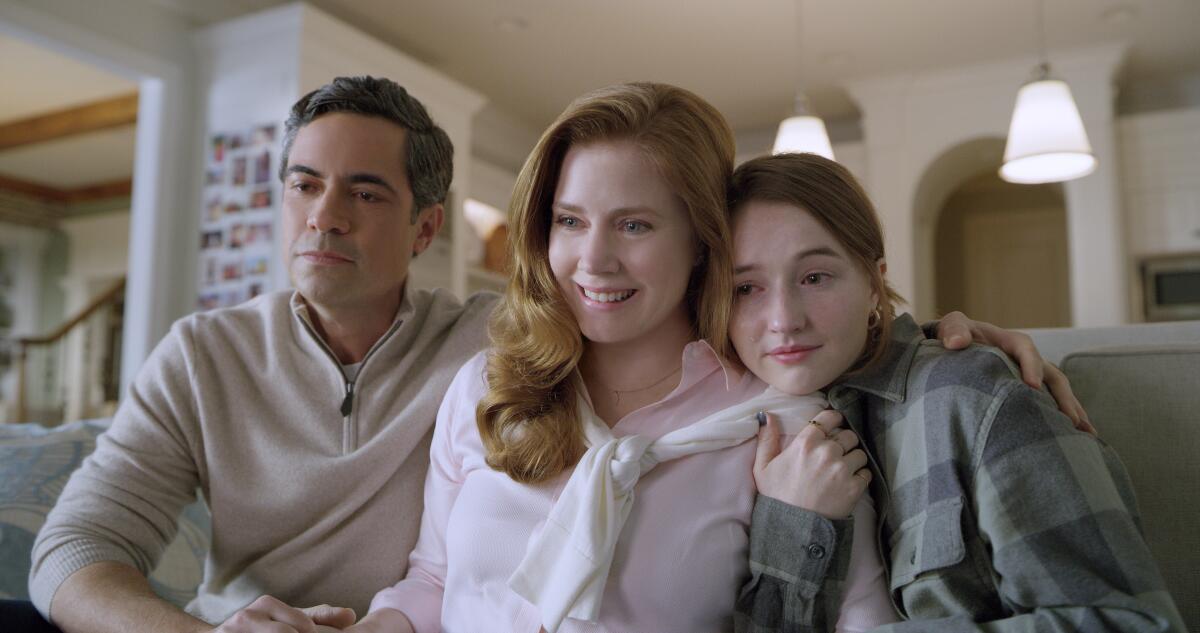Commentary: Onstage, ‘Dear Evan Hansen’ hails the difficulties of parenting. The movie gets it wrong

Warning: The following story discusses plot details of and differences between the film and stage versions of “Dear Evan Hansen.”
Onstage, “Dear Evan Hansen” begins with what is essentially a duet. Heidi Hansen, the mother of The Boy Who Lies, and Cynthia Murphy, the mother of The Boy Who Dies, are in their respective homes, simultaneously trying to get their sons motivated for their first day of school.
These women don’t know each other but, frustrated about their unsuccessful attempts to connect with their kids, they face the audience and share the song’s chorus:
Does anybody have a map?
Anybody maybe happen to know how the hell to do this?
I don’t know if you can tell
but this is me just pretending to know
So where’s the map? I need a clue
’cause the scary truth is …
I’m flying blind
And I’m making this up as I go
This opening melody, “Anybody Have a Map?,” is catchy, as most Benj Pasek and Justin Paul songs are; the actors’ blocking is fast-moving, like the morning scramble to get the whole family out of the house on time. Essentially, it’s an anthem about the “no man’s land” of parenthood, whether you’re a single mother struggling to make ends meet (Heidi) or married and financially secure (Cynthia). It’s a thankless job, and all you can do is what you can and hope it’s enough. Kicking off the show with this specific sentiment is a choice.
You won’t hear that song in the movie version of “Dear Evan Hansen,” opening in theaters Friday, which is another choice. And one that speaks to the divide between the projects even more than the normal gap between live theater and its onscreen adaptations.
In both cases, the plot then begins to unfold: An ostracized teen fibs about his friendship with a deceased classmate; the lie spirals wildly out of control, thanks to the trending tendencies of tragic-but-inspirational content online. Evan repeatedly refuses to correct the mounting misunderstandings because of what it all gets him: the adulation of his classmates, the affection of his crush and, most fascinatingly, the attention of the grieving family. With every tangential lie he tells the Murphys about the bond that never was, they feel closer to Connor, the son they just lost.
A majority of the stage show’s scenes take place in either the Murphy or Hansen households: The former is where Evan shares meals with a whole family at a dinner table, the latter is where he’s told to order takeout for just himself again, as his mother takes night classes. He spends more and more time with the Murphys, making up more and more anecdotes to earn his seat at that dinner table, in that big house, with those two parents.
“We would love to have you,” Cynthia tells him of another evening meal. The way it plays out onstage, it’s almost like Evan can’t help himself; the familial and financial stability of the Murphy household is just too readily served and, once he’s tasted it, too good to let go.

Soon, the Murphys treat him like part of their family: Evan keeps a toothbrush at their house. Cynthia insists Evan wear Connor’s tie. Larry, Connor’s father, gives him a leather baseball glove and teaches him how to break it in. The accompanying mid-tempo track “To Break in a Glove” encapsulates a father-son ritual Evan never had and a life ethos about resisting shortcuts that Larry can now pass down to a son who wants to receive it.
Evan doesn’t share any of this with Heidi because he’s lying to her too, saying he’s at another friend’s house whenever he’s with the Murphys. Whenever she tries to connect with him, he brushes her off and attempts to justify it in a conversation that leaves Heidi, according to the script’s stage directions, “utterly at sea”:
Heidi: When were you planning on telling me any of this? Or you weren’t?
Evan: When would I tell you, exactly? When are you even here?
Heidi: I’m here right now.
Evan: One night a week? Most people, their parents, they try to do a little better than that, just so you know.
Heidi finally realizes what’s been happening when the Murphys invite her over for dinner — to Evan’s surprise — and announce that they’d like to gift Evan with the college funds they saved for Connor. At home, Heidi scolds her son about the horror he’s committed: not necessarily the lying itself, but doing so to step into a family he prefers over the one he has.
Sure, it seems harmless to wonder what it might have been like to grow up in a different home, to have been raised by different parents; but it’s a hurtful fantasy that breaks a parent’s heart, especially when acted on as Evan does. “Well I’m sorry I had it rough / And I’m sorry I’m not enough / Thank God they rescued you,” Heidi sings in the guitar-driven “Good for You.”
Evan later confesses everything to the Murphys in the sob-filled song “Words Fail.” He admits his motivations were partly familial: “I never had the dad who stuck it out, no corny jokes or baseball gloves / No mom who just was there ’cause mom was all that she had to be.”
Evan and Heidi then share an honest conversation about seeing each other, with all their flaws and failed efforts, as more than enough. “And I knew there would be moments that I’d miss / And I knew there would be space I couldn’t fill / And I knew I’d come up short a million different ways / And I did, and I do, and I will,” she sings in the penultimate number, “So Big/So Small.”

The times that I’ve seen “Dear Evan Hansen” since it opened on Broadway in 2015, I’ve gotten teary not for Evan and his seemingly unending loneliness but for Heidi, who, like so many parents, did the best she could with what she had and yet was devastatingly devalued by the son she stayed to raise. The show — specifically, its nuanced illustration of how the fragile relationships between parents and children can get warped by idealistic expectations — made me think differently about my own parents, who too must have been “flying blind” and “making this up as I go,” and I’ve exited the venue with a deeper appreciation for them and all the things, big and small, they did for me.
The character of Heidi “comes from personal experience,” Rachel Bay Jones, who originated the role and won a Tony Award for her performance, told the Washington Post in 2017. “A lot of this comes from the relationship I have with my own mother, the relationship she has with her mother. And with Heidi in particular, something I can definitely relate to is that she’s just trying to survive, you know?”
Many who see the show relate to Heidi specifically. Jessica Phillips, who played Heidi on tour in 2018, was repeatedly met with thankful parents at each stage door: “She reflects that universal feeling parents have every night when they go to bed: They didn’t do a good job, they’re left out of their kids’ lives, they’re not gonna [raise] good human beings because of their own failures,” she told The Times. “Even though Heidi is often stumbling and saying all the wrong things, that doesn’t dissuade her from plowing forward.”
These parental sentiments are arguably a major part of what has made the stage show — running on Broadway, the West End and on a North American tour — a hot ticket. So it’s quite a shame that a majority of it is absent from the movie: the opening duet between Heidi and Cynthia, the bonding song with the father Evan never had, the well-deserved scolding from the mother he does. (Thankfully, the knockout Murphy family ballad “Requiem” remains intact.)

Curiously, some of the onstage dialogue before and after these numbers made it to the screen but no longer packs the same emotional punch and even undercuts it at times. For example, Heidi and Evan’s argument, set outside the Murphy home, is nearly verbatim from the stage, but instead of launching into “Good for You,” Heidi lets her son have the last word and then walks away.
She remains calm after he says some of the most hurtful things a kid can say to a parent — a superpower that many mothers have, of course — but there’s no release for her rage, and there’s no reproach for her deceitful child. Julianne Moore does what she can with the role, now trimmed to mere glimpses of their fraught mother-son bond and the ballad “So Big/So Small.”
Instead, the movie zooms in on the teenage characters and includes a new ending: Evan makes a public confession on Instagram Live, reads Connor’s favorite books and, in support of the Murphys and the foundation he co-founded in his honor, collects memories and video footage from people who were actually Connor’s friends. It’s an attempt to provide some comeuppance for Evan, to “see what he goes through and how he changes and, honestly, see the consequences, the price that he pays,” Steven Levenson, who wrote both the musical’s book and the movie’s screenplay, told the Hollywood Reporter.
It’s an impossible standard to ask a film adaptation to capture the entire experience of any stage musical. But there’s a sense of betrayal to how this movie cherry-picked from this musical, which was insightful in its portrayal of parents and the immeasurable sacrifices they make for their kids.
In the end, the adult characters were watered down for new scenes and songs that center on the teenagers, destroying the stage show’s achievement in humanizing and honoring parents — of Evan, of Connor, of the audiences watching them. So goes the song “Disappear,” another profound number cut from the movie:
No one deserves to be forgotten
No one deserves to fade away
No one should flicker out or have any doubt that it matters that they are here
No one deserves to disappear.
Ben Platt reprises his Tony-winning performance in the movie adaptation of ‘Dear Evan Hansen.’
More to Read
Only good movies
Get the Indie Focus newsletter, Mark Olsen's weekly guide to the world of cinema.
You may occasionally receive promotional content from the Los Angeles Times.












